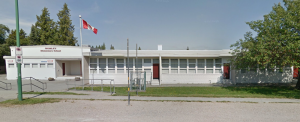Hi, my name’s Maria and for my first year at UBC I chose to join the Trek program. I can definitely say that it has caused me to have a much more engaged and rewarding first year at UBC. It’s definitely not for everyone, but I would personally recommend it for anyone who is new to Vancouver or even someone who commutes to school, like me, because it can be nice to explore different environments once in a while.
 To start off I’ll give you some background information on my placement.
To start off I’ll give you some background information on my placement.
I volunteered with Frontier College, who are a Canadian based literature organisation. Through them, I was placed at Morley Elementary in South Burnaby to help out with their program called Discovery Club. My job was to engage with the kids and help them with their homework, and occasionally (if the weather was nice enough) we would go outside and play on the playground. I chose this placement because I had some background knowledge on how to interact with children through my years in tutoring, so I felt fairly confident going into the program. What I quickly came to learn is that I had never really been in a position of authority, I was always working under someone else. Trek in this sense helped me to gain a sense of responsibility because I was now partly in charge of a group of around ten children who were looking for me to help them and organise activities for them.
I also chose Morely Elementary because it was fairly easy for me to get to. I knew my first year was going to be tough, from adjusting to a new environment to the piles of reading I had to do, I wanted this to be as easy for me to get to as possible. I got lucky in this sense because the school was in a neighbourhood very close to my own. Working in a community that seemed pretty similar on the outside to my own is where I learned a second lesson: you have to dig deep to understand the full story. The longer I spent there the more I understood how important the work I was doing there was. My volunteer supervisor once explained to me that Morley is in a “high needs and low serve” community. This is where many of the sociological concepts that we had been learning in class really kind of clicked for me, concepts which included social mobility, gentrification, schooling and social class. Many of the children at Morley came from immigrant or refugee families. This means that there might be a language barrier between the families and the material that the children were reading, so when I was helping them with their homework I came to realise the importance behind my work. Helping them with their homework made it so that when they got home their work would be done, this meant that maybe the parents didn’t have to struggle with the language barrier, or if the child was home alone for an extended period of time and they had a homework related question it would get solved at Discovery Club. All the tasks we were doing were designed for the kids to get help if they needed it. The meals that we were providing for them were there because there was a chance that there wouldn’t be one when they got home. Us teaching the kids how to cook easy meals at home that didn’t require the use of a stove or anything more complicated than a toaster oven was put in place because they kids needed these skills. This put into perspective my position in my community but also what it meant for me to be attending UBC.
The biggest lesson I learned from Trek was that I don’t want my time at UBC to be wasted, that at the end of my 4-5 years I want the years to not only have been memorable but I also want to have made some contribution to the communities outside of UBC. Trek inspired me to look at careers where I can help others, that school isn’t just about getting a financially stable job it’s also about using the advantage I was given to help promote positive change. I still don’t know the specific career I will choose, but at least I have some newly found sense of direction.
Finally, I want to leave you with some answers to the questions I had when I was in your position.

1. What requires me to do the most amount of work, Trek or Discussion?
They both require the same amount of work, it’s just in different forms. Discussions, in my opinion, are based more on written work, like papers, and of course in class participation.
Whereas Trek required from me more time and dedication. What I mean is it meant that I had to be at my placement every week for about an hour and a half and then I got to go home. This was easy for me because I lived nearby, but if you live on campus you have to take into consideration what the route looks like in the middle of winter when it’s dark outside. Trek also had group dinners that you have to attend twice, they’re not incredibly exciting but you get free food. You get to meet with Professor Greer and your Trek classmates a couple times per month to discuss the program, they were a little intimidating at first but once you get comfortable they’re pretty cool. Finally, you have to write Trek reflections, which are based on your experiences.
2. Will I be missing out on any learning experiences if I’m not in Discussion?
To be honest I don’t think you will be. This is because help is available in a variety of ways in the CAP Program. You have your CAP peer mentors who hold group study sessions before tests, and professor Greer is available during her office hours she’s quite welcoming and I’m more than certain that she can answer any questions you have.
Trek also puts the terms and concepts you’re learning in sociology into perspective. There’s nothing more educational in my opinion than learning from hand on experience. Getting out there in the field is what’s all about.
3. Will I learn how to write university level research papers, if I choose Trek?
You will learn how to write research papers in ASTU no matter what, so no worries.
4. What happens if I choose Trek and then I realise that it’s not for me?
At the beginning of the year, you will have the chance to see how discussion works because you have to attend the first two discussion classes and write a small paper for it. After that, you have to make a decision.
5. Will I be spreading myself too thin if I do Trek and I have to commute to UBC?
this was one of my concerns because my commute to UBC averages 3 hours a day. It was not pretty, but I got a lot of reading and sleeping done. If you choose your location wisely then I think it should be fine. If you choose a placement that is either close to where you live or just easy to get to by bus then it should work out. Plus a major pro for Trek is that you’re not just going to school and then home, there’s a lot of chances to be independent in volunteering. As well as exploring new communities is always very educational and interesting.
Anyways, I hope I have answered some of the questions you have regarding Trek and your first year. I’m sure everything will go just fine whether you choose Trek or Discussion, sociology is an incredibly interesting course and you’ll have fun either way!